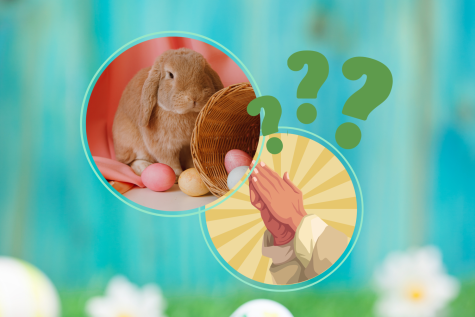Why is Easter Celebrated with Eggs and Bunnies?
You’ve seen it everywhere. Easter being advertised with fluffy bunnies and egg hunting. Isn’t it supposed to be a religious holiday?
April 18, 2022

Whether you celebrate it or not, you can’t escape the bright pink and yellow colors of Easter–with bunnies upon shelves of nearly every store and baskets of colored eggs to hide for children. However, Easter is a Christian holiday that celebrates the belief that Jesus Christ resurrected on this day three days after he died. So when did bunnies come into the picture?
Personally, growing up I never seemed to question it. I went to church and was told this was to commemorate Jesus, then went out into the yard searching for eggs. I had no complaints. It was an easy way to get free candy. It’s clear now that I’m older that the two don’t correlate. It seems like the whole free candy thing for children is pretty popular when it comes to these kinds of holidays.
After doing some research on the history of the holiday, the name Easter didn’t really have a Christian connection at all. The name “Easter” comes from a pagan origin. It stems from Eostre or Eostrae, the Anglo-Saxon goddess of spring and fertility. The eggs are used to represent fertility and birth, while the bunnies are associated with birth and renewal from the same goddess. So one common theme was apparent. Rebirth.
I guess I could see some sort of correlation when it came to resurrection and rebirth, but I didn’t see why paganism would get mixed up with Christianity. Even thinking about the baseline of the matter, bunnies don’t even lay eggs. However, these traditions happened to be introduced into the church around the 4th century A.D., according to different records of history. It was integrated by religious leaders to gain more political power amongst a wider variety of people.
Therefore, it became clear that these traditions were introduced in the early days of the Roman church to gain more popularity amongst people. It also explains why Easter is still celebrated even amongst those who aren’t religious.
So all this just got me to think: What am I really celebrating?
Am I commemorating a Christian ceremony of Jesus’ resurrection or a pagan ceremony of an Anglo-saxon goddess? Bunnies were never in the picture at all when it came to Christianity alone, neither were the eggs. They were integrated by different church leaders in ancient times.
So another question arose, does tradition change the meaning of a holiday? Just because it’s popularized now as Jesus’ resurrection, does that change the fact it still came from an entirely different religion?
It seems as though the holiday celebrates the pagan goddess aspect more than the Christian aspect, if there even is a Christian aspect at all amongst the egg hunts and bunny symbolism. It’s also just an easy way to get good advertising for different marketing companies around this time of year.
Actually, Easter is the second biggest holiday for candy sales. Americans alone consume an average of 91 million chocolate bunnies, 16 billion jelly beans and 1.5 billion Peeps each year for Easter, Insider reported. So it goes to show companies see it as a very profitable holiday from the pagan symbolism as opposed to the Christian meaning.
So, how did the eggs and bunnies come about? It was due to religious leaders mixing paganism and Christianity so they could gain more religious power. I never knew about it until I looked deeper into history, and in my opinion, it doesn’t really seem like a Christian holiday in essence, but became one as it was passed down in history. Honestly, I won’t be participating in the candy and the egg aspects of Easter, because it’s simply not biblical.
Although it may be traditional to celebrate it in that way, there doesn’t seem to be a reason to because the bunnies aren’t commemorating the resurrection of Jesus. So why include them in the first place?




















Yolanda • Apr 21, 2022 at 10:59 am
Wow amazing! This is a great article!
Everyone should read it!